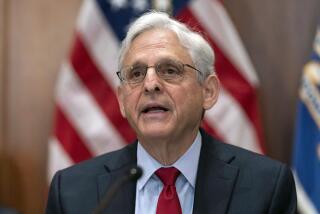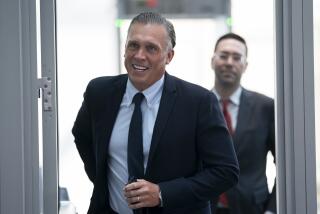New York Attorney Named to Lead Inquiry on Deaver
WASHINGTON â A federal court Thursday named New York lawyer Whitney North Seymour Jr. as an independent counsel with broad authority to investigate the lobbying activities of former White House Deputy Chief of Staff Michael K. Deaver.
Seymour, a former U.S. attorney and a registered lobbyist for the Gray Panthers, an activist group for the elderly, was authorized to look particularly at Deaverâs lobbying for Canada and Puerto Rico after he left the White House last year to set up a consulting firm.
However, the special three-judge panel gave Seymour an open mandate to investigate and prosecute âany related mattersâ that constitute possible violations of federal laws aimed at restricting the lobbying practices of former government officials.
The broad investigative scope was recommended by Deputy Atty. Gen. D. Lowell Jensen in requesting the appointment of an independent counsel. Jensen acted in place of Atty. Gen. Edwin Meese III, who had removed himself from the case because he is a longtime friend of Deaver.
In a seven-page report to the court, released Thursday, Jensen detailed what apparently are the most serious allegations against Deaver, including new information that he had lobbied President Reaganâs national security adviser in seeking to preserve a tax break for the government of Puerto Rico.
Jensenâs report said that a telephone call Deaver made last July or August to Robert C. McFarlane, then the national security adviser, âwarrants further investigationâ as a possible violation of law. Deaver, who had left the White House the previous May, was prohibited under conflict-of-interest rules from lobbying his former agency on any matter for one year.
McFarlane declined to discuss the incident Thursday.
Jensen also suggested that possible violations could have occurred in Deaverâs well-publicized lobbying on behalf of Canadaâs efforts to reach an agreement with the Administration on reducing acid rain, a pollutant believed caused largely by U.S. industry. Deaver signed a $105,000 lobbying contract with Canada after he had dealt with the issue at the White House.
âLet the Chips Fallâ
Seymour said in a statement that his job is âto let the chips fall where they may.â He pledged an impartial investigation and said that any resulting prosecution would be conducted âvigorously and on the merits.â
Deaver, who had asked the Justice Department to seek the appointment of an independent counsel, issued a statement saying he had âevery confidence that Mr. Seymour will conduct a thorough and impartial investigationâ and that he would be âfully exonerated of any wrongdoing.â
The appointment was announced by Judges George E. MacKinnon, Lewis R. Morgan and Walter R. Mansfield, sitting as a special court established by the Ethics in Government Act.
Seymour, 62, a 6-foot-6 Republican, was described by the justices in a press release as âan outstanding trial lawyer of wide experience.â
From 1970 to 1973 he headed the U.S. attorneyâs office for the southern district of New York, the most highly regarded such office in the country. He once served as a New York state senator but failed in bids for the U.S. House and Senate.
Panthersâ Lobbyist
Now in private practice in New York City, Seymour helped organize the National Resources Defense Council and is active in Citizens Against PACs, a group advocating severe limits on how much money special-interest political action committees can give to political candidates.
The justices also noted that Seymour is a registered lobbyist for the Gray Panthers. He was unavailable to discuss this or other matters, his secretary said.
Calls From Democrats
Besides Deaver, calls for an independent counsel had come from five Democrats on the Senate Judiciary Committee and from the Office of Government Ethics. In addition, the General Accounting Office had said there was evidence of possible violations by Deaver.
The post-Watergate Ethics in Government Act provides for an independent investigation of top federal officials or former officials who are accused of wrongdoing. The aim was to avoid the potential conflict of an Administration investigating its chief officers.
Limits on Lobbying
The same law seeks to curb conflict-of-interest lobbying by former federal officials. Under the statute, former officials are permanently banned from representing anyone before the government on a particular matter in which they had been âpersonally and substantiallyâ involved while in office.
Separate provisions also bar former officials for specified periods from having contacts with their former agencies and from dealing with issues once under the former officialsâ domain.
Each violation can lead to a maximum penalty of two years in prison and a $10,000 fine.
More to Read
Sign up for Essential California
The most important California stories and recommendations in your inbox every morning.
You may occasionally receive promotional content from the Los Angeles Times.










